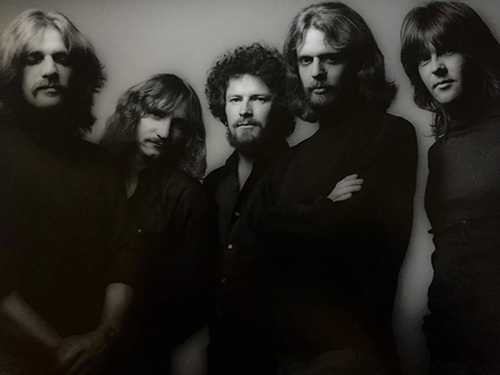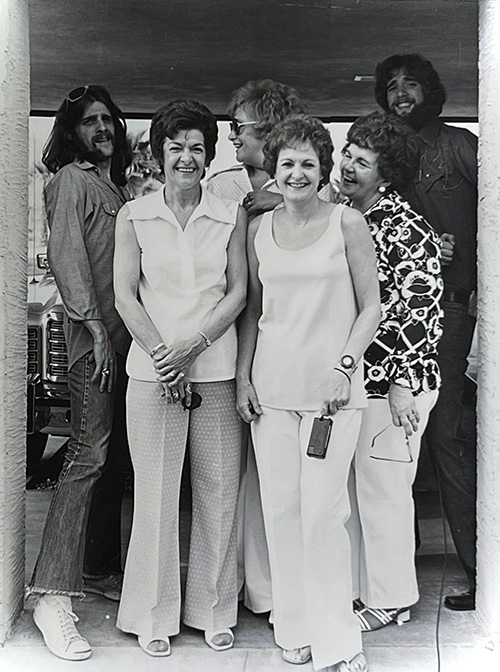
|
|
 One day in the very near future, an ambitious free market economist at the University of Chicago will scoop up an easy Nobel Prize pointing out the correlation between music sales and the Zeitgeist of an era: Ask ChatBot about “the 60's” and up will come Joanie Baez, protest, and Dylan; try the “70's,” and out will pop the Eagles and that easy, peaceful feeling of California. In fact, it was Glenn Frey who sang lead vocal on “Peaceful Easy Feeling,” and co-captained the band with drummer Don Henley, who told journalist Ben Fong-Torres: “We didn’t set out to be a band for all times. We set out to be a band for our times. And sometimes, if your good enough to be a band for your time, you become a band for all time.” Frey was from Michigan and raised in a small Detroit suburb, the son of a machinist in a shop that spun equipment for the auto industry. A rebellious teenager, Glenn grew up watching the films of James Dean and reading the novels of Jack Kerouac who, in his turn, had celebrated the open road freedom of California. Early on, Glenn taught himself to play guitar and formed a band–appropriately called The Subterraneans, after a Kerouac novel–that played local gigs. After a stint at a JC, Glenn headed for LA in the summer of 1968, at 19, with his guitar and bundle of dreams. Even then, no one needed AI to know the music business was a crapshoot. For two years, Glenn haunted music offices and hung around the clubs along Sunset Strip, hoping to get a gig. Finally, he was signed to a small record label and released an album that went nowhere.  One of the clubs Glenn frequented was the Troubadour where he met John Boyland, the manager of a pretty young singer named Linda Ronstadt. Linda had scored a hit with “Different Drum” and was looking to leave her band to go out on her own. Boyland hired Frey to play rhythm guitar and sing backup on Ronstadt’s upcoming tour. Glenn recommended a friend from the Troubadour, Don Henley, a talented Texan, who sang and played drums. According to Fong-Torres, Boyland brought a number of already established musicians onboard, including Randy Meisner, a bass player (1946-2023), and Bernie Leadon, a bluegrass artist who had played with the legendary Gram Parsons. All four were together on stage only once, as the backup band kept changing; it was a one night stand at Disneyland, but the vibes were there, and by the tour’s end, they decided to form a band: Eagles, a name Frey supposedly chose–in the rock world there are often multiple versions of a story-- because it sounded like a street gang. By 1972, the band had an album which included “Take It Easy,” their first big hit, which Frey wrote with Jackson Browne, along with “Witchy Woman,” a Don Henley-Bernie Leadon composition. Jack Tempchin, a friend from San Diego, contributed another song, “Peaceful Easy Feeling,” and the Eagles had their sound, country rock with its images of high desert sunrises and break-your-heart girls. Frey and Henley proved a good team; over the next eight years they had a string of hits that eased into classics: “Tequila Sunrise,” “New Kid in Town,” “Lyin’ Eyes,” the last of which Frey wrote and sang lead on. The song, it was said, was about a Playboy model that he had been dating. It never hurts a rock band to have a sharp agent–and the Eagles found one in Irving Azoff, a University of Illinois dropout who had mastered the science of entertainment deals. “To get his clients top dollar,” Cameron Crowe of Rolling Stone wrote, “he’ll rip up a contract–yell, scream....” In 1976, the Eagles released Hotel California, an album that sold 32 million copies worldwide. The eponymous title track was written by Frey and Henley and based on a melody by Don Felder who had replaced Bernie Leadon. Frey later said the song represented “a weird world peopled by freaky characters”–and that, too, captured a side of LA and Southern California. |
||
|
||
| AL: | What was it like growing up with Glenn in Michigan?
|
| GMcG: | Glenn’s mother, my aunt, Nelly, and my mom were closest friends. There were four sisters, part of the Markham clan that had come from West Virginia. We grew up in Royal Oak, a Detroit suburb. There were little two bedroom houses with a basement and an attic. Glenn was sharp and kind of knew it. He wrestled in high school at Dondero and spent time in the basement playing piano. I told him, “You’re going to play piano, I think.”
|
| AL: | As Glenn’s younger cousin, you got to see his personality up close.
|
| GMcG: | He liked cars. He would cruise Woodward Avenue on the weekends. That was “the scene,” back then, He was a partier, but very ambitious. Glenn had 12 cylinders instead of 8. He was a scrapper. Didn’t take any s—. He could look right through you. But once I remember I heard loud crying echoing down the stairs from Glenn's bedroom, and Aunt Nelly told me it was over his girlfriend.
|
| AL: | A lot of stories have mentioned James Dean’s influence on Glenn. |
| GMcG: | He was like a James Dean personality. Do what the “F” you want. In Cameron Crowe’s movie, Almost Famous, about a rock band, there is a scene where a rock singer jumps off a balcony into a swimming pool. When I saw it, I said: “That’s Glenn.”
|
| AL: | You were at the Beatles concert when Glenn decided he would be a rock star.
|
| GMcG: | It was 1964. My father, Mickey McGuire, was a photographer for the auto industry. He had some connections and made a phone call to get tickets. Glenn and I went with my sister Darcy. It was a pivotal moment. Paul McCartney was on stage clapping his hands over his head. Women were fainting left and right. A Black girl fell back into Glenn's arms. He later told me: "I looked at her, I looked down at them, and said: "I'm going to do that." A year later at a family party he shows up with a guitar and starts playing the Stones’ “Heart of Stone” and smiling. He played it five times. He had perfect rhythm. Amazing presence. He would hit it.
|
| AL: | Later, in California you went on tour with the Eagles as a photographer. How would you compare Glenn with Don Henley?
|
| GMcG: | Henley was a word guy. He had a legal pad filled with words. He would do a rough draft of a song, then he and Glenn would battle it out. Glenn was the harmony guy. He crafted things. He knew which person should sing. Henley was cool, kind of quiet. A Texan. On tour every night he was perfect. He never missed a note.
|
| AL: | Glenn had the reputation of being a perfectionist. |
| GMcG: | There was the 1977 tour where they played Montreal, Cleveland, the LA Forum. After one concert, Glenn was still pissed off at Randy Meisner at one in the morning. Any little thing bothered him. He felt Meisner was “not steppin’ up” when they did “Take It to the Limit.” And he felt Bernie Leadon wouldn’t perform in the studio. He wanted people to “step up,” not be passive when they recorded. “I want a bullet,” he would say. To Glenn, in making an album you learned how to do it live. When you saw an Eagles’ concert that was Glenn.
|
| AL: | People like to find hidden meanings in the Eagles’ songs.
|
| GMcG: | Regarding "Hotel California," Glenn told me what it means, and it's not about anything satanic, contrary to rumors. But I can't say what he told me in confidence.
|
| AL: | Were there musicians Glenn was close to?
|
| GMcG: | The two people he spoke often to me about, that he cared about, were Bob Seger and Joe Walsh. In Michigan, Bob Seger saw something in him and let him sing backup on “Against the Wind.” Glenn seemed to take Joe under his wing. He wanted Bob Seger to come to California.
|
| AL: | How did success affect Glenn?
|
| GMcG: | He once said, “My residual checks are so good they are scary.” He was really good to his mother, Nelly, and father, Eddie. He would take his mother in a personal plane to see a play. He loved his dad. Growing up, Glenn heard my father play boogie-woogie on the piano. One time he was jamming with Don Henley and Elton John. He told them, “You should hear my Uncle Mickey play.”
|
| AL: | Did you ever think Glenn would become a rock star?
|
| GMcG: | When Glenn left for California, I was still in high school. I thought it was the last I would ever see of him. He might take LSD and jump off a building. One day I was sitting in Aunt Nelly’s kitchen, just talking and listening to music. While we were sitting there, “Take It Easy” came on the radio.
|
Background material was obtained from Wikipedia’s entry on Glenn Frey, Eagles by Ben Fong-Torres (Welbeck ed., 2020) and Rock Me on the Water by Ronald Brownstien (HarperCollins, 2021). Photos courtesy of Gary McGuire. |
|
